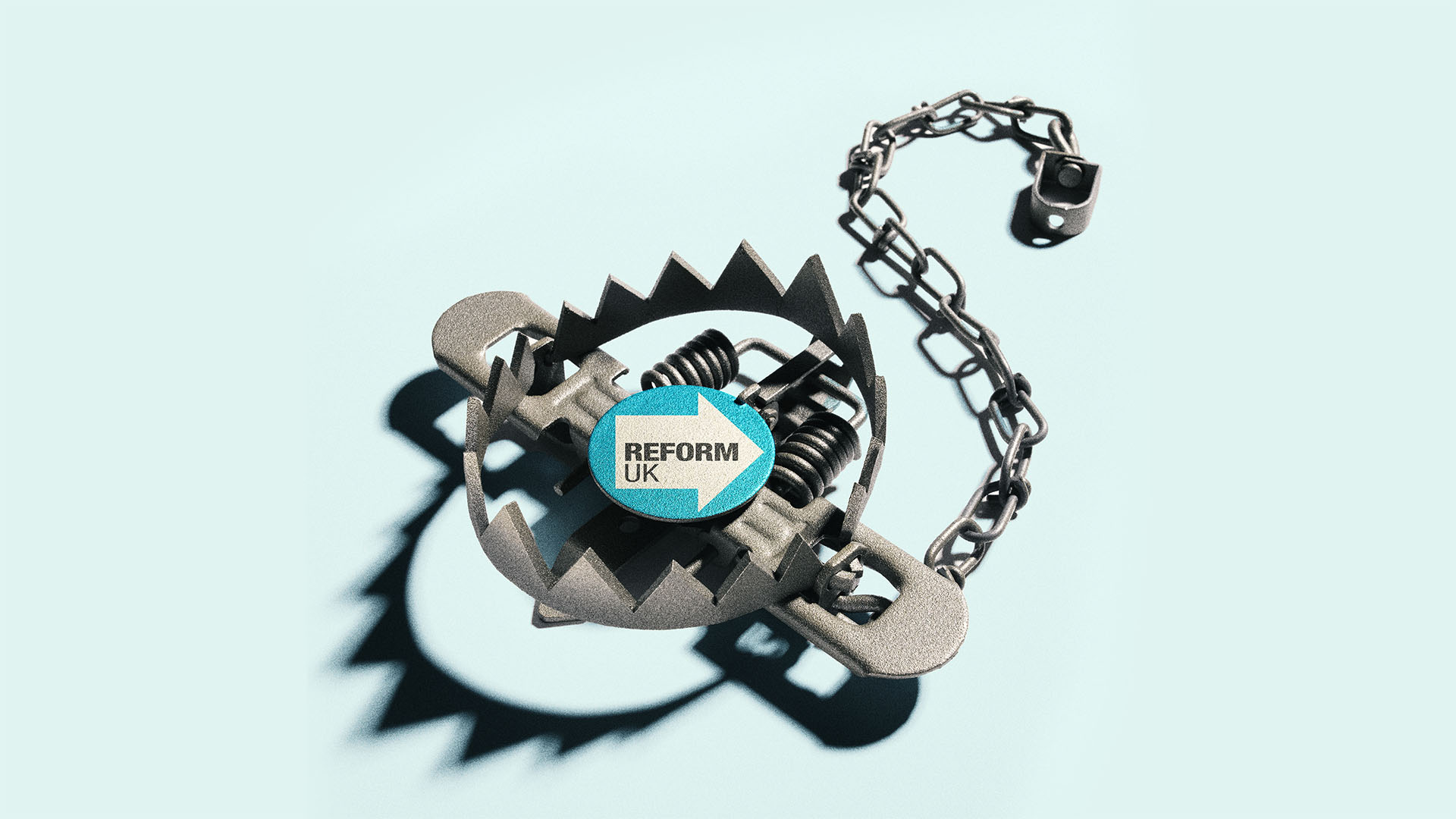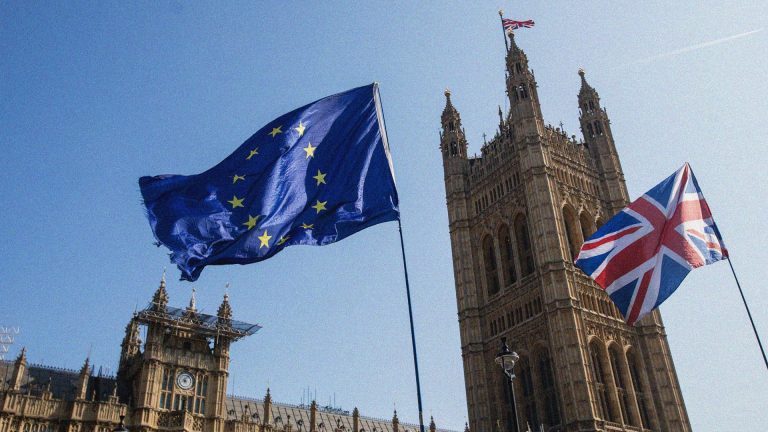Election nights can make desperately dull TV. There’s live camera coverage of pieces of paper being placed in piles and counted in sports halls, graphics are produced that don’t mean very much, while barely known politicians trawl round the studios to read out their talking points in the small hours.
But they occasionally deliver genuine drama, like last week when Britain was shaken awake by Nigel Farage’s Reform party, which caused what was called a “political earthquake” with its by-election victory over Labour in Runcorn & Helsby, as well as a string of other wins in council and mayoral contests. And the hours of analysis, updates and reactions to that result have created a solid-seeming narrative that Farage has now broken the century-old Conservative-Labour duopoly on power.
Maybe he has. Although Reform’s breakthrough was on a low voter turnout in a relatively small number of places, it confirmed what the polls were already telling us. First, that the Tories are still flatlining and in a possibly existential battle for survival. Second, Keir Starmer – less than a year since his party won one of the largest majorities in history – has now got a big problem himself.
This goes deeper than Farage or a Trumpian appeal to some voters’ anti-immigrant, anti-woke, anti-net zero sentiments. Polls suggest that Labour is fighting a battle on multiple fronts. Its fragile coalition of voters is splintering in different directions, some going to Reform and the Tories, but at least twice as many going to the Liberal Democrats and the Greens, as well as left-wing independents in some urban areas and a revitalised SNP in Scotland.
Farage is drawing the bulk of his new support from the Conservatives and a disillusioned group that doesn’t usually vote but whose apathy has turned to antipathy. Far and away the biggest factor driving votes away from Labour to these other parties is the cut in winter fuel allowance for all but the poorest pensioners. It’s a policy that is now almost universally recognised inside the government as a disaster – an “icon of betrayal” as one minister puts it – which has saved less than £1bn at a cost of almost limitless political capital.
Labour MPs openly express fear about their prospects. Some believe mitigating the winter fuel decision is a precondition of even getting a hearing from the electorate. Others also want to re-think the reductions in disability benefits, which are regarded by some key groups of voters as showing the government is “not strong but just mean”.
Still more on the right of the party demand that Starmer should “take a leaf” out of Donald Trump’s playbook with populist-sounding measures on grooming gang inquiries and immigration. And, bang on cue, new policies to cut legal immigration are already being portrayed by the media as a direct response to the rise of Reform. The atmosphere has become toxic. People who oppose what they see as a rightward drift in British politics are accused of being one of those reviled out-of-touch metropolitan types, who their enemies say just don’t understand Britain at all.
In some circles it has become fashionable to big up the socially conservative “Blue Labour” faction as the party’s last best hope of restoring its “covenant” with the traditional white working class. Certainly, Blue Labour’s founder, Lord Maurice Glasman, is everywhere right now. In an interview for The Observer, he predicted with relish the end of “globalised trade” while being billed as “the man of the moment” with a “hotline to both the White House and Downing Street”. Then, writing for the Sun this week Glasman called for the scrapping of the Human Rights Act and abandoning the European Convention which Starmer has decribed as his “lodestar”, as well as a new alliance with Ukraine to “hold the balance of power” against – er – France and Germany.
Read more: The ghosts of Downing Street
I’m pretty sure these won’t be government policy any time soon and that should, perhaps, indicate that reports of Glasman’s influence have been exaggerated. Although it’s been claimed he carries great sway with Morgan McSweeney, Downing Street’s chief of staff himself tells anyone who will listen that he has only met Glasman once in the past five years. Indeed, when one of his disciples allegedly working with Number 10 recently described Blue Labour’s mission as leading a “revolt against change”, you have to wonder if it has any meaningful connection with a government that was elected on a platform of change.
As for the claim that the Home Office’s new immigration policy is a response to Reform’s success in last week’s elections, Downing Street is understood to have wanted its policy announcement out long before now. The release has been delayed by another week in the vain hope it will stop journalists linking the policy to Reform’s electoral success.
Indeed, there is frustration within Starmer’s top team that so much of what they do is infected by Farage or interpreted through the prism of his rise in the polls. But some of them also accept that the reason the media so often reach for lazy narratives about Reform or Blue Labour is because the government hasn’t yet developed a compelling story of its own.
A lot of thought is going into how popular policies like new workers’ rights, renewable energy, faster hospital appointments and an increase in the minimum wage can be linked with some of the difficult decisions, particularly on tax and spending which made them possible.
But for now at least, Starmer will resist pressure to lurch either left or right. Instead, he will focus on all those long term missions and milestones in his “plan for change” that he feels have been overlooked in recent months. In the coming weeks, there will be big announcements on infrastructure and industrial strategy, the defence review, as well as a reset in relations with the European Union. These have less to do with any ideology than with what allies describe as his pursuit of the national interest, for which he has earned some admiration for his work on the international, if not yet domestic, stage.
If he needs a lesson from history, the prime minister might also remember how Farage has threatened to “break the mould” before in his previous incarnations as leader of UKIP and the Brexit party, when he twice topped the poll in elections for the European parliament. Ten years ago, David Cameron was so worried about UKIP that he promised an in/out referendum on Europe. That didn’t go as planned. Then in 2019, Boris Johnson stole Farage’s thunder by promising to “get Brexit done”. And we all know how well that one worked out too.
The noise coming from within the Labour party is no one’s idea of easy listening. But, just as the prime minister knows he must turn to face the music, I think he also recognises it would be a terrible mistake to start dancing to Farage’s tune.








